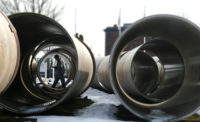One month after Exxon Mobile’s Pegasus pipeline ruptured in Mayflower, Arkansas, spilling thousands of gallons of crude oil in a residential neighborhood, the same pipeline spilled again in Ripley County, Missouri. The second Pegasus line spill – which was much smaller than the first -- occurred despite the fact that the operation was shut down after the first spill.
This spill reinforces the idea that the proposed Keystone XL pipeline is too risky, according to the All Risk, No Reward Coalition, which opposes the pipeline.
“Two tar sands spills in one month is devastating no matter where it happens, but it is particularly alarming that Keystone XL would run through one of our country’s largest sources of freshwater that provides irrigation and drinking water for millions of Americans,” said coalition Chair Randy Thompson. “The images from the Arkansas community were awful. Just imagine those same photos from the Ogallala Aquifer, and the financial damage that would cause. America cannot afford this kind of risk.”
Business groups say technology will minimize environmental risks
The Keystone project, which is awaiting a final decision from President Obama, would transport oil sands from Alberta, Canada, through the U.S. heartland to Saudi-owned refineries on the Gulf Coast. It has widespread support from industry and business groups, who say environmental risks are minimal because of the cutting edge technology which would be used in building the pipeline.
That’s not good enough for a group of Mayflower residents called “Remember Mayflower, Arkansas.” They’ve just released an ad to spread the message that tar sands oil and water don’t mix.
The coalition says TransCanada, which would own and operate the Keystone pipeline, has an “atrocious” safety record.
Says the group: “Their original Keystone pipeline experienced 12 separate spills in the United States in the first year of operation– nearly one every month. One of those spills alone released 21,000 gallons of dirty tar sands oil. Between the U.S. and Canada, the original Keystone pipeline had “over 30 spills” in its first year, according to a report by Cornell University’s Global Labor Institute.”
Since then, the line was temporarily shut down in 2012, a few weeks ago, and just the other day.
Disagreement over jobs, energy independence
“The increased supply of crude oil from KXL will greatly contribute to our economic and energy security, and our move toward North American energy self-sufficiency,” wrote Karen Harbert, president and CEO of the U.S. Chamber of Commerce's Energy Institute, in a statement submitted to the State Department. “The economic impact and long term benefits of the construction of the KXL pipeline are significant and vitally important to American jobs and the economy, especially during this time of economic recovery."
The coalition cites a State Department Environmental Impact Statement showing that the pipeline will create only 35 permanent jobs, and said the pipeline will not reduce dependence on Mideast oil because the oil will likely be exported overseas.



